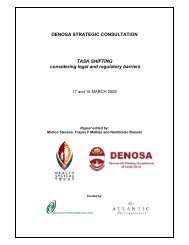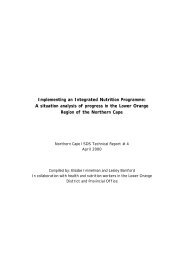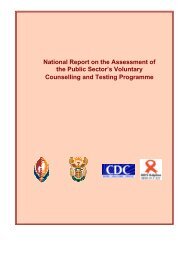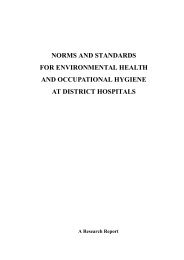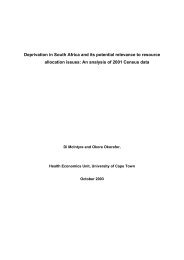SAHR 2007 - Health Systems Trust
SAHR 2007 - Health Systems Trust
SAHR 2007 - Health Systems Trust
Create successful ePaper yourself
Turn your PDF publications into a flip-book with our unique Google optimized e-Paper software.
The private hospital industry faces a challenge in terms of<br />
diversifying procurement of supplies to include black-owned<br />
suppliers of goods and services. Whilst both Netcare and<br />
Medi-Clinic have made specific commitments to implement<br />
preferential procurement strategies, no concrete decisions<br />
have emerged in this regard with both hospital groups<br />
stating that they are waiting for the finalisation of the <strong>Health</strong><br />
Charter. 6,7<br />
Mechanisms to increase<br />
affordability of private hospital<br />
services<br />
Only a few wealthy individuals and households can afford<br />
to self-fund admission to a private hospital without experiencing<br />
financial difficulty. This is because a routine admission<br />
to a private hospital facility is generally beyond the affordability<br />
for the average South African.<br />
Efforts to increase affordability of private hospital services<br />
have not been aimed at compelling private hospitals to<br />
undercut their prices in ways that would threaten financial<br />
viability. Focus has rather been on utilising the excess capacity<br />
that exists in the private health care sector and specifically<br />
in private hospitals. Attempts are also underway to<br />
ensure that existing pricing practices are enhanced to<br />
become more transparent and efficient. Lower bed occupancy<br />
rates in private hospitals have led to expectations<br />
that these beds could be utilised to facilitate access to<br />
low income earners. Efforts to increase utilisation of excess<br />
private hospital beds however, require additional input by<br />
medical specialists and the shortage of specialists limits the<br />
potential for this to occur.<br />
Existing pricing practices and cost structures in the private<br />
hospital industry are opaque and health care funders find it<br />
difficult to engage effectively with hospitals in price negotiations.<br />
Currently, only the Medi-Clinic private hospital group<br />
publishes its tariff schedule on its website. Concerns exist<br />
that the prevailing fee-for-service reimbursement mechanism<br />
creates incentives for specialists and hospitals to adopt a<br />
‘more is better’ mentality. This situation has led to various<br />
stakeholders adopting a view that greater transparency in<br />
the pricing of hospital services could significantly improve<br />
affordability.<br />
Conclusions<br />
Private hospitals have experienced rapid growth, which<br />
gained remarkable momentum since 1990. During the same<br />
period, members of medical schemes significantly shifted<br />
preferences from public to private hospitals. The growth<br />
of the private hospital sector has been accompanied by<br />
a dramatic escalation of costs in private health care and<br />
this has raised concerns around the affordability of medical<br />
scheme premiums.<br />
In general, far more resources are being spent on private<br />
hospital services which cater for the hospitalisation needs<br />
of only 7 million beneficiaries of medical schemes than on<br />
public sector patients. This exacerbates the inequalities that<br />
already exist between the public and private sectors in terms<br />
of affordability and accessibility to health care. The private<br />
hospital industry, though making a significant contribution to<br />
the overall health system, engages in non-price competition<br />
which can result in inefficient decision making on where to<br />
locate facilities or acquire advanced medical equipment.<br />
The industry’s pricing and cost structures are also difficult to<br />
understand and the existing doctor-centric model increases<br />
potential for incentives to over-service patients. Arguments in<br />
this regard prompted the Competition Tribunal to conclude<br />
that a detailed inquiry into physician-hospital relationships<br />
needs to be conducted. 21<br />
A moratorium on growth of hospital beds was not effective<br />
in limiting hospital cost growth as private hospitals innovated<br />
means to bypass this moratorium by building step-down facilities.<br />
Furthermore, the attempt to control increases in number<br />
of hospital beds was too blunt an instrument to contain cost<br />
escalation because changes in bed type within a hospital<br />
also has a significant impact on resource requirements.<br />
Significant merger and acquisition activities took place<br />
during the 1990s and continued into 2006. Private hospitals<br />
have grown in Gauteng, Western Cape and KwaZulu-<br />
Natal, which are provinces with the highest medical scheme<br />
population. The trend amongst private hospitals has been to<br />
invest in surgical beds (rather than other types of beds) and<br />
theatres as they generate more revenue for hospitals. The<br />
CMS has been involved in a number of Competition Tribunal<br />
matters in order to raise awareness among the competition<br />
authorities of the impact of increasing market concentration<br />
on costs.<br />
<br />
Available at: http://www.mediclinic.co.za<br />
The industry has demonstrated commitment to improve the<br />
representation of black persons in its ownership structures,<br />
although challenges remain on the procurement side.<br />
172







